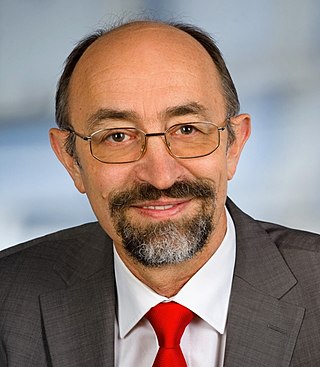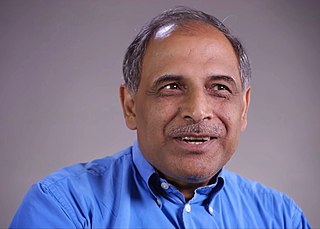
Hydrology is the scientific study of the movement, distribution, and management of water on Earth and other planets, including the water cycle, water resources, and drainage basin sustainability. A practitioner of hydrology is called a hydrologist. Hydrologists are scientists studying earth or environmental science, civil or environmental engineering, and physical geography. Using various analytical methods and scientific techniques, they collect and analyze data to help solve water related problems such as environmental preservation, natural disasters, and water management.
Hydroinformatics is a branch of informatics which concentrates on the application of information and communications technologies (ICTs) in addressing the increasingly serious problems of the equitable and efficient use of water for many different purposes. Growing out of the earlier discipline of computational hydraulics, the numerical simulation of water flows and related processes remains a mainstay of hydroinformatics, which encourages a focus not only on the technology but on its application in a social context.

The Isfahan University of Technology (IUT) is a leading public university in Iran, situated near the city of Isfahan. The university comprises 14 faculties and departments, serving approximately 11,000 students and employing 600 academic staff members. IUT offers undergraduate, graduate, and doctoral programs across four main disciplines: engineering, basic sciences, agriculture, and natural resources. Notably, IUT was the first Iranian university to gain membership in CERN.

Rafael Luis Bras is a Puerto Rican civil engineer best known for his contributions in surface hydrology and hydrometeorology, including his work in soil-vegetation-atmosphere system modeling.
The Journal of Hydrologic Engineering is a monthly engineering journal, first published by the American Society of Civil Engineers in 1996. The journal provides information on the development of new hydrologic methods, theories, and applications to current engineering problems. It publishes papers on analytical, experimental, and numerical methods with regard to the investigation and modeling of hydrological processes. It also publishes technical notes, book reviews, and forum discussions. Though the journal is based in the United States, articles dealing with subjects from around the world are accepted and published. The journal requires the use of the metric system, but allows for authors to also submit their papers in other systems of measure in addition to the SI system.
The following outline is provided as an overview of and topical guide to hydrology:

Seyed Majid Hassanizadeh is a professor of hydrogeology at Utrecht University, where he heads the Hydrogeology group at the Faculty of Geosciences. His research focuses on flow of fluids and transport of solutes and colloids in porous media, through theory development, experimental studies, and modeling work. In particular, he focuses on two-phase flow, reactive transport in variably-saturated porous media, transport of micro-organisms, and biodegradation.

Jasper A. Vrugt is a Dutch scientist/engineer/applied mathematician known for his work in the earth sciences: surface hydrology, soil physics, hydrogeophysics, hydrometeorology, and geophysics. Vrugt is an assistant professor at the University of California, Irvine and holds a joint appointment in the Department of Civil and Environmental Engineering and the Department of Earth System Science. He also holds a part-time appointment as associate professor at the University of Amsterdam, Faculty of Science (CGE).
Soroosh Sorooshian is an Iranian-born American civil engineer, and educator. He is a distinguished professor of civil and environmental engineering at the University of California, Irvine and currently serving as the Director of the Center for Hydrometeorology and Remote Sensing.

Murugesu Sivapalan is an Australian-American engineer and hydrologist of Sri Lankan Tamil origin and a world leader in the area of catchment hydrology. He is currently the Chester and Helen Siess Endowed Professor of Civil and Environmental Engineering, and professor of Geography & Geographic Information Science, at the University of Illinois, Urbana-Champaign. Sivapalan is widely recognized for his fundamental research on scale issues in hydrological modeling, his leadership of global initiatives aimed at hydrologic predictions in ungauged basins, and for his role in launching the new sub-field of socio-hydrology.
Miguel A. Marino is an American engineer, currently the Distinguished Professor Emeritus of Hydrologic Sciences, Civil and Environmental Engineering and Biological & Agricultural Engineering at University of California, Davis, and also a published author. He was honored as a Distinguished Member of the American Society of Civil Engineers (ASCE) in 1999, and a Life Member in 2005, as well as being the ASCE's Editor of its journal Journal of Water Resources Planning and Management in 1984-88.

Professor Günter Blöschl is an Austrian hydrologist, engineer and academic.

Georgia "Gia" Destouni is a Professor of Hydrology at Stockholm University. She works on the Baltic Sea Region Programme as well as studying the impact of climate change on societies in Northern Europe. She is the chair of the Global Wetland Ecohydrology Network (GWEN) and was involved with the National Geosphere Laboratory.

Ranjith Pathegama Gamage, a Fellow of the Australian Academy of Technology and Engineering, is an Australian academic based at Monash University, where he holds the position of Professor in Geomechanics Engineering. His research has significantly influenced understanding of the Carbon sequestration. He has also developed new sustainable technologies for extracting resources from deep earth and natural gas from coal seams, shale, and tight geological formations.

Shafiqul Islam is a Bangladeshi American researcher, academic and author. He is a Professor of Civil and Environmental Engineering and Professor of Water Diplomacy at Tufts University. He serves as the Director of Water Diplomacy. He is also the Founding Editor of the Water Diplomacy Series.

Abhijit Mukherjee is an Indian professor, scientist and currently Professor of Geology and Geophysics and the School of Environmental Science and Engineering of IIT Kharagpur. He has been selected for Shanti Swarup Bhatnagar Prize for Science and Technology in 2020 in the field of Earth Atmosphere Ocean and Planetary Sciences.

Marc Brendan Parlange is an American academic, recognised for his research expertise in environmental fluid mechanics and research in hydrology and climate change. His contributions primarily relate to the measurement and simulation of air movement over complex terrain, with a focus on how atmospheric turbulence dynamics influence urban, agricultural and alpine environments and wind energy. He has also been active in addressing water resources challenges and environmental change in remote communities, particularly West Africa.

Upmanu Lall is an Indian-American engineer and the Alan and Carol Silberstein Professor of Engineering at Columbia University. He serves as Director of the Columbia Water Center. Lall studies water scarcity and how to predict and mitigate floods. He was named an American Geophysical Union Fellow in 2017 and their Walter Langbein Lecturer in 2022. He was elected a fellow of the American Association for the Advancement of Science in 2018, and has received the Arid Lands Hydrology and the Ven Te Chow Awards from the American Society of Civil Engineers. In April 2021 he was named to the “Hot List of the world’s 1,000 top climate scientists” by Reuters.
Abdin Mohamed Ali SalihFAAS FTWAS FIWRA (Arabic: عابدين محمد علي صالح, a Sudanese Civil Engineering Professor at the University of Khartoum and a UNESCO expert in Water Resources.
Richard M. Vogel is an American hydrologist and environmental engineer and professor emeritus in the department of civil and environmental engineering at Tufts University.













